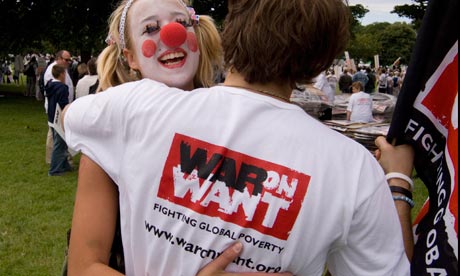 Posted by: John Hilary 14 February 2011
Posted by: John Hilary 14 February 2011 
War On Want: Marking 60 years of fighting global poverty. Photograph: Mike Russell/War On Want
Sixty years ago, on 12 February 1951, the Manchester Guardian carried a letter from Victor Gollancz calling for people to join him in an urgent campaign against world poverty and militarism. Britain was at that time fighting an unwinnable war in Korea, and Gollancz asked all those who agreed with his call for a negotiated settlement to end the conflict to send him a postcard marked with the single word "yes".
The letter provoked a massive response. Within a month, Gollancz had received more than 10,000 postcards, and War on Want was born. The future prime minister Harold Wilson, then an ambitious Labour MP, was tasked with drawing up a plan for world development, which was published the following June. The report cited the yawning gap between the world's rich and poor as "the supreme challenge of the next 50 years", and called for a popular movement to address that challenge.
Even at this early point in its history, War on Want affirmed that development is first and foremost a political issue. Harold Wilson's report had stressed that the fight against poverty should be seen not as "an exercise in condescending charity from the rich to the poor" but as a campaign against injustice. When Wilson himself was elected prime minister in 1964, he immediately established Britain's first Ministry of Overseas Development as a key part of his government, with a former War on Want trustee, Barbara Castle, as minister in charge.
War on Want's conviction that all poverty is political was strengthened by the famine that swept across the Sahel in 1973. This was the first "televised" African disaster, and the British public responded generously to the joint appeal from the Disasters Emergency Committee (DEC). War on Want had been part of the DEC, but became increasingly unhappy with a simplistic response to such disasters. In 1974 it carried out a detailed analysis of the causes of the famine, which found that it was caused by profound social and economic changes over decades of colonial and neo-colonial domination, not by famine. As a result, War on Want turned away from aid delivery and instead backed a five-year political programme to address inequitable land distribution and the lack of employment opportunities.
War on Want's overtly political stance has brought the organisation into regular conflict with the authorities, as in 1971, when War on Want came out in support of the national liberation struggle in Bangladesh. When the Charity Commission complained that a War on Want advertisement raising awareness of the plight of the Bangladeshi people "had crossed the borderline into the political sphere", War on Want fought back, publicising the case and challenging the Commission's judgment. It was deluged with telegrams of support and funding to cover legal costs.
War on Want was equally forthright in its support for the Nicaraguan people under the Sandinista government, which had introduced a body of progressive reforms to address the high levels of poverty inherited from the Somoza dictatorship. Yet when War on Want launched a "Nicaragua must survive" campaign to defend the country against US aggression in 1985, the organisation again became a target of the political right. Fresh complaints were made to the Charity Commission, which censured the organisation both for its support to the Nicaraguan people and for its active engagement with the anti-apartheid struggle in South Africa.
Today War on Want continues its work in partnership with some of the most innovative political and social movements around the world. This includes landless people's movements in Brazil and Mozambique, women's rights groups in Colombia and Honduras, trade unions in Bangladesh and Sri Lanka, as well as liberation forces in Palestine, Western Sahara and Iraq. War on Want runs hard-hitting campaigns against corporate and government targets alike, and is the only major British charity prepared to call for the immediate withdrawal of Nato troops in order to end the slaughter in Afghanistan.
This political approach still brings the organisation into conflict with the authorities. Zionist groups have made repeated complaints to the Charity Commission over War on Want's vocal support for the boycott, divestment and sanctions movement in Palestine, but War on Want has successfully fought off all such attacks. Most recently, War on Want has been cited to the Charity Commission by the Tory MP Matthew Hancock over the organisation's support for direct action by UK Uncut activists against tax dodging by companies..
Once again, War on Want is unrepentant. We believe that the fight for justice requires us to challenge the root causes of poverty, not its symptoms. That means contesting power through political action, not repeating endless calls for charity and aid. As we are witnessing today in Egypt, Tunisia and many other countries, millions of activists around the world still put their lives on the line on a daily basis to defend their rights. The least we can do is stand in solidarity with them.
http://www.guardian.co.uk/global-development/poverty-matters/2011/feb/14/war-on-want-60-year-struggle











No comments:
Post a Comment